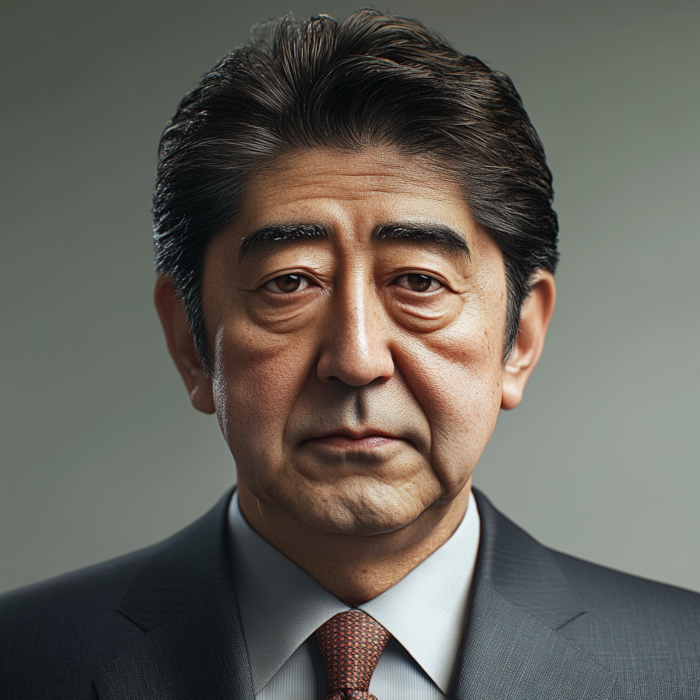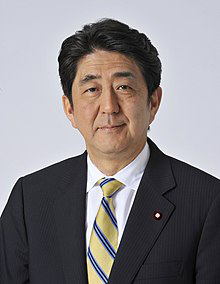


Shinzo Abe (1954–2022) was a Japanese politician who served as the Prime Minister of Japan for two non-consecutive terms: from 2006 to 2007, and again from 2012 to 2020. He was Japan’s longest-serving prime minister and one of its most influential political leaders in recent history. Abe is best known for his economic policies, commonly referred to as "Abenomics," as well as his efforts to reform Japan’s military capabilities and strengthen its role on the global stage. His leadership was marked by a focus on revitalizing the Japanese economy, promoting nationalism, and seeking to revise Japan’s pacifist post-World War II constitution. Abe’s assassination in 2022 shocked Japan and the international community.
Birth and Family Background: Shinzo Abe was born on September 21, 1954, in Tokyo, Japan, into a prominent political family with deep ties to Japan’s conservative Liberal Democratic Party (LDP). His father, Shintaro Abe, served as Japan’s foreign minister, and his maternal grandfather, Nobusuke Kishi, was a controversial figure who served as prime minister from 1957 to 1960 after being accused of war crimes following World War II. Abe’s family background profoundly influenced his political ideology and career.
Education and Early Career: Abe studied public administration at Seikei University in Tokyo and later pursued further studies in political science at the University of Southern California. He began his political career in the 1980s, working as a secretary for his father and then serving in various government positions. In 1993, Abe was elected to the House of Representatives, the lower house of Japan’s National Diet, representing the Yamaguchi Prefecture.
Becoming Prime Minister: In September 2006, Shinzo Abe became Japan’s youngest post-World War II prime minister at the age of 52, succeeding Junichiro Koizumi. He quickly positioned himself as a nationalist leader focused on reforming Japan’s constitution, particularly Article 9, which renounces war and prohibits Japan from maintaining a standing military.
Resignation in 2007: However, Abe’s first term as prime minister was short-lived. His government faced multiple scandals, political missteps, and a worsening economy. His approval ratings plummeted, and after just one year in office, he resigned in September 2007, citing health problems related to ulcerative colitis.
Return to Leadership: After a period of recovery and ongoing political involvement, Abe staged a comeback and was re-elected as prime minister in December 2012. His return marked the beginning of a more stable and influential period in Japanese politics. Abe’s second term lasted until 2020, making him Japan’s longest-serving prime minister.
Abenomics: One of the cornerstones of Abe’s second term was his economic policy, known as "Abenomics." It was designed to combat Japan’s long-standing economic stagnation, deflation, and aging population. Abenomics rested on three pillars: monetary easing (to increase inflation), fiscal stimulus (government spending), and structural reforms (to boost economic growth). While Abenomics initially showed some success in revitalizing the Japanese economy, the long-term effects were mixed, and Japan continued to face economic challenges during and after Abe’s tenure.
Foreign Policy and National Security: Abe was a strong proponent of strengthening Japan’s national security and expanding its global influence. He sought to revise Japan’s pacifist constitution, particularly Article 9, to allow Japan to play a more active role in regional and global security. Although he was unable to achieve a full constitutional revision, Abe succeeded in passing legislation in 2015 that reinterpreted Article 9, allowing Japan’s Self-Defense Forces to participate in collective self-defense, meaning they could defend allies under attack.
Abe also worked to strengthen Japan’s alliances, particularly with the United States. He forged close ties with U.S. Presidents Barack Obama and Donald Trump and promoted Japan’s role in regional security, particularly in response to the rise of China and the threat posed by North Korea’s missile and nuclear programs.
Diplomacy with China and North Korea: Abe’s foreign policy sought to balance Japan’s economic relationship with China and its security concerns. Although tensions with China persisted over territorial disputes in the East China Sea and historical grievances, Abe managed to maintain a working relationship with Chinese leadership. On North Korea, Abe took a hardline stance, supporting sanctions and emphasizing Japan’s security needs in the face of Pyongyang’s nuclear ambitions.
Relations with South Korea: Abe’s tenure was marked by strained relations with South Korea, particularly over historical issues related to Japan’s colonial rule of Korea (1910–1945) and the issue of "comfort women" (Korean women forced into sexual slavery by the Japanese military during World War II). Despite efforts to reach agreements, these historical grievances continued to affect diplomatic ties between the two countries during his time in office.
Womenomics: As part of his broader economic reform agenda, Abe promoted the idea of "Womenomics," which aimed to increase female participation in the workforce as a way to address Japan’s shrinking labor force and boost economic growth. He introduced policies designed to improve childcare access, promote gender equality in the workplace, and encourage more women to take leadership roles. While progress was made, critics argued that many of these reforms did not go far enough, and Japan continued to lag behind other developed nations in gender equality.
Immigration and Demographics: Abe faced the challenge of Japan’s rapidly aging population and declining birthrate, which posed significant threats to the country’s long-term economic stability. Although traditionally opposed to large-scale immigration, his government made some concessions by expanding visa programs to attract foreign workers in certain sectors. However, his policies stopped short of fully embracing more liberal immigration reforms.
Constitutional Revision: Throughout his political career, one of Abe’s central goals was to revise Japan’s pacifist constitution. He argued that Japan needed to take greater responsibility for its defense and play a larger role in global security, especially given the challenges posed by China and North Korea. While Abe did not achieve his ultimate goal of a constitutional revision, his reinterpretation of Article 9 and his efforts to strengthen Japan’s Self-Defense Forces marked significant steps toward a more assertive national security posture.
Assassination: On July 8, 2022, Shinzo Abe was assassinated while delivering a campaign speech in Nara, Japan. He was shot by a lone gunman with a homemade firearm. The assassination shocked Japan, a country with strict gun control laws and very low levels of political violence. Abe’s death sent shockwaves across the international community, with world leaders expressing condolences and praising his legacy.
Motive and Aftermath: The suspect, Tetsuya Yamagami, was arrested at the scene. According to police, Yamagami harbored resentment against a religious group that he believed had ties to Abe, and his motives were not politically driven. The assassination prompted reflections on Abe’s legacy and debates over the security of public figures in Japan.
Longest-Serving Prime Minister: As Japan’s longest-serving prime minister, Abe left an indelible mark on the country’s politics and economy. His policies, particularly Abenomics, aimed to revitalize Japan’s stagnant economy, though their long-term success remains a topic of debate. His efforts to redefine Japan’s role in global security, including the reinterpretation of Article 9, will be remembered as one of his most significant contributions.
Nationalism and Historical Legacy: Abe was a nationalist leader who sought to restore pride in Japan’s postwar identity and move the country away from the pacifism that had defined it since World War II. However, his views on Japan’s wartime history, including his visits to the controversial Yasukuni Shrine, which honors Japan’s war dead (including convicted war criminals), sparked criticism both domestically and internationally, particularly from China and South Korea.
Global Impact: Abe played a key role in strengthening Japan’s alliances with the U.S. and other democracies in the Indo-Pacific region. His advocacy for the Free and Open Indo-Pacific strategy has been influential in shaping regional security dynamics, particularly as China’s influence has grown. Abe’s diplomatic efforts to maintain a balance between security and economic cooperation with China, while supporting regional partnerships, left a lasting impact on Japan’s foreign policy.
Shinzo Abe’s life and career had a profound impact on Japan’s domestic and international landscape. His policies aimed at revitalizing the economy, reshaping Japan’s defense policies, and asserting Japan’s global role defined his leadership. Though his tenure was not without controversy, particularly in relation to historical issues and his nationalist agenda, Abe’s influence on Japan’s political trajectory and his vision for the future of the country have left a lasting legacy. His assassination in 2022 was a tragic and shocking end to a life of public service, and it prompted widespread reflection on his contributions to Japan and the world.

We use cookies
We use cookies and other tracking technologies to improve your browsing experience on our website, to show you personalized content and targeted ads, to analyze our website traffic, and to understand where our visitors are coming from. Privacy Policy.